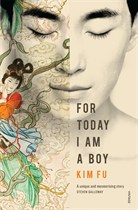lip lit: for today I am a boy

Kim Fu’s debut novel, For Today I am a Boy, is an elegant and often heart-wrenching story of an individual’s struggle for identity and belonging.
The protagonist is Peter, a long-awaited son, born into a first-generation Chinese family in Ontario. He is given the middle-name Juan Chaun – ‘Powerful King’ – a moniker that reveals his father’s expectations for the boy. Peter has three sisters, and by age six knows that he has more in common with them than with the boys in the school-yard.
“But I want to be like you,” I said, grabbing Adele’s knee. “I want to have hair like you. I want to be pretty like you.” Her sad, saintly expression frightened me.
“You can’t.” Helen had turned in her chair. Adele glared at her. “What?” Helen said. “He can’t. You can’t, Peter. You can be handsome, like Father or Bruce Lee.” . . . I started to cry. “You’re a boy.” Helen said it like she thought it would be comforting.
“I am not! I am not!”
The novel traces Peter’s journey from the naiveté of youth in small-town Ontario into a world of bitter-sweet unknowns.
It is in part a tale of self-discovery, and Fu refuses to shy away from how painful and terrifying finding your true self can be. Peter’s path is littered with bullies and critics, yet he somehow clings to life, drawn ever onward by the idea of becoming Audrey, the woman he knows himself to be.
The majority of the novel is written through Peter’s perspective, as a person identified through male pronouns, which is why this synopsis does the same. It has been described as less than an ‘issues’ book about transgender identity, and more of a coming of age novel, focussed on a person who is trans*. This is a fair summation of the novel’s orientation; the story is as much about Peter coming to terms with the implications of his father’s actions and Peter’s position as a Chinese-Canadian as it is about the journey from Peter to Audrey.
Kim Fu’s writing style is sparse, avoiding the melodramatic that such intense content can bring. Each encounter Peter has through his life, whether with Christian ‘ex-gays’, trans* men and women, or his own sisters, is captured plainly yet clearly. We, as readers, are shown the realities of Peter’s complicated existence through these vignettes. The progression of the book is mimetic of the process of remembering one’s own life – capturing a series of defining moments, no matter how small they seem individually.
My only complaint with For Today I am a Boy is that at times, the novel feels as though it is a much larger story, cut down into a 239 page book. There are so many gripping story lines that are introduced with mammoth detail (such as Peter’s sister Adele’s experiences in Berlin, which has its own chapter) that are never returned to. The stories of the sisters are particularly engaging, and as a feminist reader, I found myself asking how these three confident, bright women are torn down, and how they manage to regroup at the end of the novel. We are really not given enough of their journeys; what we are shown only exacerbates the loss of their voices. The novel would thus benefit from either trimming the sisters’ stories to a slimmer background that won’t leave the reader wanting more, or expanding them into fully-fledged character arcs.
For Today I am a Boy is a tumultuous but stunning novel. Kim Fu is a promising writer, and I look forward to seeing what amazing stories she tells in her future works. If your New Year’s resolution was to diversify your reading habits, pick up this book as soon as possible. You won’t put it down until it’s done.
Image: Random House

